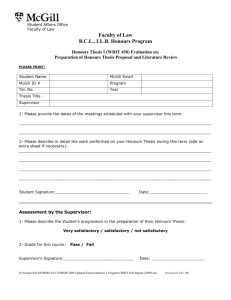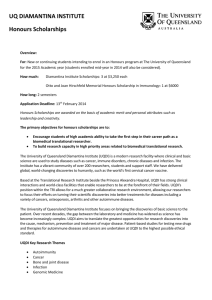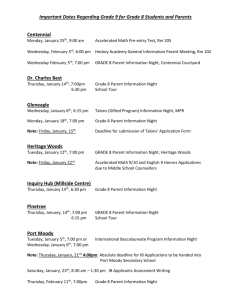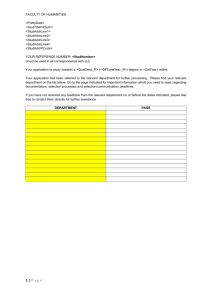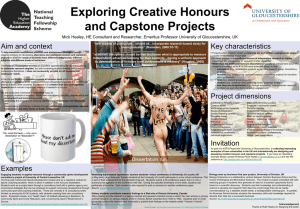Honours Programme Handbook - Universiteit Stellenbosch
advertisement
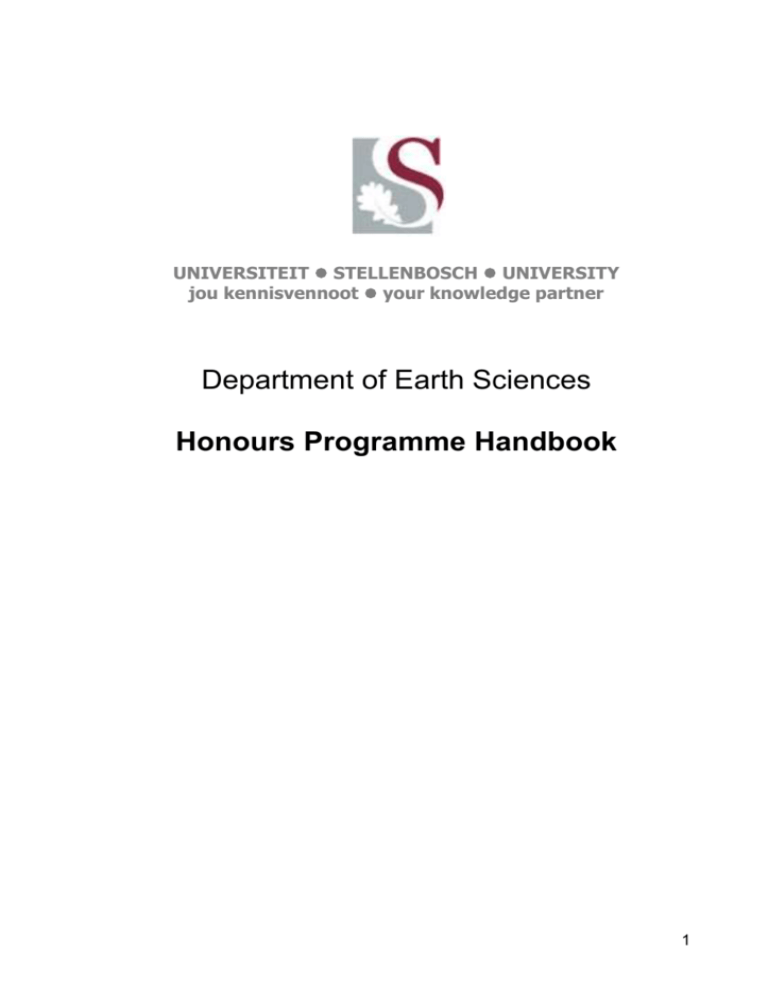
UNIVERSITEIT STELLENBOSCH UNIVERSITY jou kennisvennoot your knowledge partner Department of Earth Sciences Honours Programme Handbook 1 Welcome to Stellenbosch as an Honours student or a prospective Honours student. We hope you find this small information handbook helpful; we are always ready to improve it, if you have suggestions. A note about telephone numbers: All phone numbers listed in this handbook are given as extension numbers (e.g., x1111). To dial internally, you just use the 4 digits. To phone from outside the University, or on a cell phone, you need to dial 021 808 and then the 4 extension digits. 1. DEPARTMENTAL RECRUITMENT AND ADMISSION PROCEDURE This section sets out procedures and protocols for Honours student application and registration in the Department of Earth Sciences at Stellenbosch University. These requirements are additional to the regulations of the Science Faculty that governs enrolment, and to the Faculties’ guidelines for the postgraduate students. The student must complete the departmental formalities before registering with the Faculty. a. Application process and requirements For application, a BSc degree with Geology as major is required. An average final mark of at least 60% for Geology 3rd year modules is required, but the Department of Earth Sciences reserves the right to evaluate each case individually. Basic computer skills are required. Students must apply on the prescribed form no later than October 1 of the preceding year. For eligibility and application requirements, please consult the most recent Faculty of Science Calendar/Handbook. Application process differs for internal (currently enrolled Stellenbosch students) and external (students from outside Stellenbosch University) applicants. External applicants must apply on-line through post-graduate admissions website (Website: http://www0.sun.ac.za/pgstudies/) on or before October 1 of the preceding year. Internal students must obtain a hard copy of the prescribed application form from Admin A building (Room A2028, Current contact person: CS Fransman) and submit it to the same office before the cut-off date. You may also download the application form through the Earth Science web site (www.sun.ac.za/earthsci). 2 b. Recruitment procedure Profs Roychoudhury and Clemens form the Honours programme selection panel. As a result of the Department’s decision to enlarge the Honours intake to a maximum of 25 students from 2010, and the increased numbers of applications from graduates from other universities (including foreign institutions), the selection process has been formalised, as of 2010. To ensure that we can manage the numbers of students who we accept in various sub-disciplines, the following measures have been put in place. 1. The overriding principle in recruitment is that we require the students with the highest academic standing. This means that we apply the criterion that students will only be eligible for consideration for Honours enrolment if their average mark for their core modules (3 rd year Geology/Environmental Geochemistry) is at least 60%. Applicants wishing to apply for Environmental Geochemistry stream must take OGC314 in third year. Mark for OGC314 is substituted in lieu of one of the geology modules with least mark when calculating the aggregate. However, a 60% aggregate does not automatically guarantee admission into Honours and the Department reserves the right to evaluate each case individually. The second criterion is that the student has a willing supervisor and a project lined up. External applicants must contact Honours programme co-ordinator or respective lecturers in their field of interest before applying to ascertain possible supervisors. It can happen that we have a large number of applicants, possibly all with good prospects. Thus, we also have to set up some priorities, other than academic standing, to guide us in student selection. Thus, with students ranked first according to academic results, the following will be the tertiary order of selection: a. Stellenbosch graduates b. South African graduates of other SA universities c. Foreign graduates of other SA universities (priority to SADC citizens) d. Foreign graduates of foreign universities (priority to SADC citizens) We will also do what we can for diversity and redress. 3 2. There will be a notional limit on the number of Honours students whom each staff member can supervise. The limit is flexible (ideally 2 to 3) but 4 students/person will be the maximum for staff involved in the usual academic duties. Individual staff members may put a lower limit on their potential Honours supervisions (e.g., if they have heavy commitments in a particular year). We will honour such requests as long as they are not detrimental to the honours programme. 3. While this is most likely not going to be a problem for some subdisciplines, it may mean that, in some cases, we have too many students wishing to do their project in a specific field. To cover this eventuality, we will use the following procedures: a. During the second half of each year (around September), staff members will be asked to produce a list of possible Honours projects (either as well defined projects, or as a broader statement, such as “projects are available to work in the general area of ..., with individual projects to be defined in consultation with interested students"). At this point supervisors will also have the opportunity of specifying the (maximum) number of students who they wish to supervise. b. When applying, students will specify in which general field (or with which individual, if applicable) they wish to do their project. The students will tick a box or boxes for igneous/metamorphic petrology, sedimentology/petroleum geology, environmental geochemistry and economic geology. c. When selecting students for enrolment, the selection committee will try to ensure that we do not enrol more students than we can deal within each sub-discipline. Naturally, we will keep a number of students on a reserve list, to cover the inevitable cases of students deciding not to come to US to do Honours (for whatever reason). d. If we see a potential problem developing, (e.g., too many good students applying in a given field), there are two options: i. We can advise them of the problem and ask them whether they would consider a change of project area/supervisor. ii. In a case where we have a very good student in an oversubscribed area we may exercise the option of asking the potential supervisor 4 whether they believe that they can supervise more than the normal maximum of 4 students. 4. The final selection of students and allocation of supervisors will be carried out in a special meeting of the Department’s academic staff members, and the results will be conveyed to the students as soon as practicable after that. 2. FACULTY ADMISSION a Registration Following successful fulfilment of admission criteria, you are permitted to register with the Faculty of Science on a specific registration day, prior to commencement of the programme, as advertised by the Faculty. As from acceptance at Faculty level, you are officially an Honours student at Stellenbosch. On site registration usually takes place in Admin A building. Students; however, also have a choice of e-registration or postal registration. For more information on pre-registration process contact the faculty officer (currently Mr B. Abels, x4832). For preregistration, you need to know exactly which modules you will be registering for. Without that information you will not be able to complete the registration process. b. Allocation of email address/ID card On registration, new students from outside Stellenbosch University are automatically allocated an email address based on their student number in the university-accepted format (SNo@sun.ac.za). Following registration, students must go to room# 2006 in Admin A building for issuance of their ID card as well. This ID card is used to provide you access to the Earth Sciences building, specific laboratories and other amenities. Incoming Stellenbosch University students can continue to use their previous student email address and ID card. However, the ID card must be reactivated for the year of their registration. 3. HONOURS PROGRAMME STRUCTURE AND ORGANIZATION a. Structure The Honours programme in Earth Sciences runs over one year, divided into two semesters, and does not necessarily follow the usual University 5 calendar and examination timetable. Details of the timetable and examination dates are provided on the orientation day, prior to commencement of the programme. Within the honours programme, the students have a choice of specializing in one of the three streams. The streams are: (1) Applied Geology; (2) Environmental Geochemistry; and (3) Petroleum Geology. The choice of stream will have been made already, during the application process. The programme is composed of three compulsory modules, a research project and two further modules from one of the three streams. The content of each module is further divided into sections or submodules, at the departmental level, and may vary from year to year. The specific content of modules for each year is provided prior to commencement of honours teaching. In consultation with their supervisor and the honours coordinator, it is possible for students to take elements of different modules. Compulsory modules (credits = 80) 12240 - 771(15) Geology of Southern Africa 12241 - 772(15) Research Methods in Earth Sciences 12242 - 773(15) Special Topics in Earth Sciences 54895 - 795(35) Research Project Choice of one stream (credits = 40) Stream A – Applied Geology (credits = 40) 12243 - 712(20) Concepts in Crustal Evolution 12247 - 742(20) Economic Geology Stream B – Environmental Geochemistry (credits = 40) 12244 - 714(20) Hazardous Waste Site Assessment 12275 - 744(20) Environmental Systems Stream C – Petroleum Geology (credits = 40) 12547 - 716(20) Facies and Basin Analysis 12549 - 746(20) Reservoir Characterisation and Upscaling As part of the Special Topics in Earth Sciences, students must choose two sub-modules, either offered as a special topic itself or one of the existing sub-modules from a stream other than their stream of specialisation. b. Language In the Honours programme in Earth Sciences, the medium of instruction and examination is English. 6 c. Assessment All modules in the honours programme, with the exception of the research project, are assessed through a combination of theory and practical work and/or an examination. Certain sub-modules are not assessed through a formal examination, as indicted below in the marking scheme. Also, certain sub-modules have no formal examination and are assessed on continuous basis, during the module, in the form of assignments and class tests. The research project is assessed through submission of a final research report and an oral presentation. To pass the honours year, students must pass all modules with a 45% subminimum. To pass honours, tudents must pass each individual module (not submodules) as well as the project, and must have an overall average of 50% or above in 778 d. Examinations Formal module examinations are held toward the end of each semester. The dates for the examinations are indicated on the timetable provided at the beginning of the course. All exams are subject to external moderation for quality and fairness. At honours level, second opportunity examinations are not an option unless a student fails to write the exam because of a genuine serious medical condition. A formal medical certificate clearly describing the serious medical condition and signed by a qualified doctor (not the one obtained from student health centre) is required for granting of a second examination opportunity. If, after writing the exam, a student fails to qualify in a module, under certain conditions they may be allowed to return next year to complete the module. Failing more than two modules automatically disqualifies a student from pursuing his/her honours degree any further. e. Marking scheme When calculating aggregate marks, as per the University norm for a semester-long or shorter modules, class marks and exam marks are weighted as — class 40%; exam 60%. Furthermore, when calculating overall marks for the module, each sub-module is weighted according its duration. Core modules 771 Geology of Southern Africa 70% + Honours Field Tour 30% 7 772 GIS 50% + Geostatistics 50% + Analytical Techniques (not assessed) + Writing Skills (not assessed) 773 Special Topics I 50% + Special Topics II 50% Elective modules 712 Igneous Petrology 25% + Metamorphic Petrology 25% + Structural Geology 25% + Geochronology 25% (each module of equal length) 714 Hazardous Waste Site Assessment (weighted for 4 week) + Marine Geochemistry (weighted for 2 week) + Analytical Laboratory Techniques (not assessed) - class + exam marks each as described above 742 Mineral Economics (weighted for 4 weeks) + Ore Microscopy (weighted for 2 weeks) + Geophysics (weighted for2 weeks) - class + exam marks 744 Soil Geochemistry (weighted for 4 weeks) + Environmental Isotopes (weighted for2 week) + Geohydrology (weighted for 2 weeks) - class + exam marks each as described above 716 Basin Analysis (weighted for 4 weeks) + Structural Geology (weighted for 2 weeks) + Marine Geochemistry (weighted for 2 weeks) - class + exam marks each as described above 746 Reservoir Characterization (weighted for 4 week) + Geohydrology (weighted for 2 week) + Geophysics (weighted for 2 week) - class + exam marks each as described above 795 Project: Thesis 70% + Presentation 30% Thesis (internal examiner 50% + external examiner 50%) Presentation (average of internal examiner + external examiner + supervisor) Overall average 778 — Average of all individual modules attempted. To pass honours the average must be 50% or above. f. Limits and submission of your thesis In short, you are supposed to submit your honours thesis for examination by the deadline indicated on the timetable. If you do not make satisfactory progress during the year (as judged by your 8 supervisors and the HoD) your registration can be terminated. Please remember that support for a research project is costly to the DoS and the Department. You will learn about formatting your thesis in your writing skills module. There are no page limits for your thesis. However, an honours thesis is typically no longer than 40 – 50 pages of text (double spaced) and figures, excluding appendices. You are required to submit two ringbound hard copies and one electronic copy to the Programme Coordinator (currently Prof AN Roychoudhury, Room 2014) by the deadline given on your timetable. No extensions are permitted under any circumstances. Failure to submit a thesis automatically disqualifies you from graduating with an honours degree. 4. SUPERVISION OF RESEARCH WITHIN HONOURS PROGRAMME All honours students in ES need to have at least 1 supervisor. The supervisor (or Director of Studies) is the staff member with whom you have regular supervisory contact and the person who will guide you through your research project. You may have additional supervisors in other academic institutions, government facilities or industry, who may assist academically, if required. The role of the supervisor is to guide you through the learning process of conducting research through collection, manipulation and interpretation of data. At the end, students are examined on the thesis produced. Therefore it is expected that the majority of the interpretation of data and text in the theses reflect the student’s own work or thinking, and not those of the supervisor. Complaints or concerns regarding supervision should first be made to the Honours Programme Co-ordinator. If the student receives, in their judgement, no satisfactory resolution, representation should be made, in writing, to the DoS, with a copy to the HoD. The HoD will then meet with the student and DoS to help resolve the issue. If the issue happens to be with the Programme Co-ordinator or HoD, as DoS, representation should be made to another senior staff member (Professor/Associate Professor) of the department. 9 5. PLAGIARISM Plagiarism, as defined in the 1995 Random House Compact Unabridged Dictionary, is the "use or close imitation of the language and thoughts of another author and the representation of them as one's own original work”. Within academia, plagiarism by students is considered academic dishonesty or academic fraud, and offenders are subject to academic censure, up to and including expulsion. The most common infraction is to cut and paste sections of previous work without reference to the source. Even if the source is referenced, this is still plagiarism unless the piece is given within quotation marks and the reference is given, with a page number in the original publication. Beware; the University has zero tolerance for plagiarism. 6. IP RIGHTS Since your thesis is part of your research output while you are a student enrolled at the University of Stellenbosch, the intellectual property rights (IP) resides with the University of Stellenbosch In special cases, the IP rights may belong jointly to the University and an industry or government sponsor of the research. Please also be aware that all samples that you use for your research must legally be archived by the Department. It is therefore your responsibility to ensure that each sample is catalogued, labelled and the sample locality accurately and fully specified. Thin sections, rock powders, mineral separates, epoxy mounts and XRF disks remain the property of your supervisor and the Department, and must likewise be archived. 7. DEPARTMENTAL CONTACTS Your Honours Programme Co-ordinator is your first port of call for all enquiries related to the programme. After that you have a list of other people in the Department who can assist you in various ways. Honours Programme Co-ordinator – general enquiries about admissions and overall programme co-ordination including timetabling and other requirements for the Honours year. Currently – Prof AN Roychoudhury, Office 2014, tel: x3124 10 Head of Department (who also chairs the Research and Honours Admissions Committee) – general enquiries about matters that cannot be resolved through the programme co-ordinator or your thesis supervisor currently – Prof. John Clemens, office: 2027, tel: x3159, jclemens@sun.ac.za Departmental Officer / Secretary – financial enquiries, vehicle bookings (at least 24 hours notice required) currently Mrs Loxie Conradie, office 1011, tel: x3219, lcon@sun.ac.za Senior Technical Officer – reporting of safety concerns, equipment faults and deficiencies in general, non-laboratory supplies currently – Mr George Olivier, office: 1036, tel: x3118, olivierg@sun.ac.za CAF liaison officer – information regarding analytical and equipment facilities available to Earth Science students through the Central Analytical Facility . Currently – Prof Ian Buick, office: 2029, tel: x3128. buick@sun.ac.za 8. UNIVERSITY ADMINISTRATIVE CONTACT POINTS University Help Desk – can potentially be useful but rather phone the section you really want to speak to. It will be more efficient and effective. tel: x4669 Postgraduate and International Office – general enquiries and assistance for international students, information on funding, skills development, accommodation, etc. tel: 2565, interoff@sun.ac.za web site: http://www0.sun.ac.za/international/ Faculty of Science – rules and regulations and specific information about procedures, applications, bursary information Faculty Manager – general enquiries tel: x3760 Faculty Officer – rules and regulations tel: x4832 http://science.sun.ac.za/index.php?alias=students&calias=students02&l ang=eng 11 University Language Centre – general assistance with language issues, translations, short courses in writing skills, thesis editing, etc. web site: http://www0.sun.ac.za/taalsentrum/student-home.html tel: x2159 University Library – The majority of science students make use of the central library (JS Gericke Library) on the main campus. Details on how to make an efficient use of our library are available on the library website (http://library.sun.ac.za/English/userguides/Pages/postgraduatesresearchers.aspx). For advance usage and information you may contact Science Faculty librarian (Currently Pieter Du Plessis, pdupless@sun.ac.za, tel: x4430) Campus Health – medical services and advice, Monday – Friday: 08h00 – 17h00, tel: x3392 http://www0.sun.ac.za/kampusgesondheid/ Student Counselling and Development – careers, counselling, therapy, disabilities, tel: x4707; 37 or 49 Victoria Street, Stellenbosch http://www0.sun.ac.za/cscdnew/lang/en/contactkontak Campus Security – patrols, emergency reaction, incident reporting tel. for service problems: x3775 tel. for emergencies x2333 Campus Map http://www.sun.ac.za/university/Virtual%20Views/map.pdf 9. ACCESS TO ANALYTICAL FACILITIES a. Central Analytical Facility The Central Analytical Facility (CAF) manages most analytical facilities that you are likely to use at Stellenbosch. Many of the relevant instrument laboratories are actually located within the Chamber of Mines building (e.g. SEM, ICP) and some are located in other University buildings (e.g. XRF, XRD). You can find out what is available and who to contact about access to a particular facility by visiting the CAF web site: http://academic.sun.ac.za/saf/ This site also contains forms for sample submission to certain facilities. 12 Access to some of these facilities (e.g. the two SEMs in the Chamber of Mines Building and XRD) is controlled through an on-line booking system that you can find using either MS Office Outlook or Office Outlook web access (Stellenbosch University Webmail). In Outlook you will see a folder called Public Folders. In this folder, navigate to the Central Analytical Facilities folder. Within the CAF folder, navigate to the relevant CAF facility and click on the calendar within each to book instrument time. Note that there are 2 SEMs that can be booked. The older of the two (SEM calendar) is used for cathodoluminescence (CL) imaging. The newer instrument (WDS and EDS SEM calendar) is used for analysing the major-element compositions of minerals, X-ray compositional mapping and back-scattered electron (BSE) imaging. Note that this method of booking is not available to Mac users through MS Office Outlook. To get around this problem you can access the public folder if you have a Windows OS installed on your Mac as a virtual machine (e.g., using VMware Fusion, BootCamp, etc.). In other cases (ICP-MS, LA-ICP-MS and XRF) you need to contact the CAF staff member responsible for the particular analytical facility to book time on instruments (LA-ICP-MS) or to have samples collected for XRF. Training in analytical techniques, data reduction and interpretation is a fundamental part of a research degree. The extent of student participation within CAF varies, depending on the technique used. For example, after appropriate training, you can expect to be involved in all your imaging and collection of EDS/WDS mineral major-element compositions using the SEM, X-ray maps and all data reduction. On the contrary, for XRF you will not be running the instrument but, depending on the level of your supervisor's funding, you may have to crush and powder the samples yourself. Never book analytical time without receiving prior approval to do so from your DoS. All instrument time is charged for and you have to check that your supervisor is providing funds to cover this. Certain other CAF facilities are grouped under what might be called sample preparation. These include rock cutting, grinding, crushing and polishing (e.g., in lab 1022), as well as mineral separation facilities (in the rear quad). Access to these, particularly the mineral separation, grinding and polishing is controlled. Mr Fundisile Nkumenge will provide you with necessary training and oversight. Fundisile is the first port of 13 call for ordering of consumables, and will be monitoring the cleanliness of preparation areas. Please keep rock preparation areas clean. Failure to do so may result in the contamination of your samples or those of others. It will also result in denial of further access to preparation areas. If a facility is broken, either by you or others, please report this immediately to either Fundisile or the Departmental Technical Officer (Mr George Olivier). It can take quite a while to order replacement parts and/or service machinery and severe delays will eat into your research time. For thin sections please consult your supervisor. We have limited provision for making polished thin sections in the department but, in many cases, thin sections are outsourced to laboratories in other institutions. Whether produced here or elsewhere you will certainly be involved in cutting rock samples into thin section briquettes. Note that, in early February, there will be a short introduction to CAF facilities and analytical methods given as part of the Honours course. b. Departmental Facilities Some additional facilities that you may need to use fall under the control of the Department of Earth Sciences. The most important of these are: Field Store This contains a variety of equipment that is available for use in the field and for camping. However, the equipping of undergraduate field trips must take precedence over your possible needs. If you wish to use something you need to approach the Senior Technical office, Mr George Olivier. Research Microscopy Laboratory (room 2037) This facility houses the research-grade petrological microscopes, the photomicroscope and the A3 flatbed scanner. The Department’s Senior Technical Officer (Mr George Olivier) oversees access. Always replace the microscope covers after using. Do not consume food or drink in this lab. If you wish to scan a solid specimen, always place a sheet of clear plastic between the sample and the glass on the scanner. Report any problems to Mr Olivier, immediately and police each other’s use of this lab as well. 14 Environmental Geochemistry Research Laboratory (room 1015) This lab is exclusively for the use of students working on projects supervised by Prof. Roychoudhury. Prof. Roychoudhury is the responsible member of staff. Access is restricted. Ultra-clean Laboratory (in rear quad) This lab is under the strict control of Prof. Roychoudhury and is only used for highly specialised sample preparation and analysis. Access is restricted. Experimental Petrology Laboratory (in rear quad) This laboratory houses high-pressure and high-temperature apparatus of various kinds, used to investigate Earth materials properties and behaviour at deep-Earth conditions. The equipment is the joint property of Profs Gary Stevens and John Clemens. Access is restricted to specially trained students working with one of these two staff members. Geological Compasses, GPS units and Geiger Counters, etc. The Department has a stock of such items that you may be able to take into the field. The needs of the undergraduate fieldwork programme take precedence, however. If you would like to take such equipment for your own fieldwork, you need to talk with the Senior Technical Officer (Mr George Olivier), who has custody of these things and can arrange for the forms, etc. that you will need to complete to borrow them. Computers and Software Honours students normally make use of the common computer lab in Room 2023. The lab is supplied with Windows desktop computers to use, and a connection to the Internet. Some basic and geology software will be present on the computers. However, if you require specialised software packages, the use of a laptop computer or a computer with an operating system other than Windows, you or your thesis supervisor must supply these for you, out of his/her research cost points. Note that, as per University regulations, you must pay for your Internet access, as well as any printing or photocopying charges that you may incur. We cannot stress strongly enough the need for you to backup your important research files and thesis parts. The worst has a way of happening, so regularly back up your data, etc. to an Internet Cloud, a 15 hard disk or a large-capacity USB flash disk. Keep the backup disk in a separate place from your computer. Telephones For organizing your project-related research field trip / accommodation / vehicle booking, you may, with express permission from your supervisor, request the departmental administrator to make use of her phone (Currently, Senior Departmental Officer: Ms Loxie Conradie; Room 1011). For reporting emergencies in the laboratories, make use of the phone in the laboratory, if available. For all other purposes, you may only use your own personal phone. Other Facilities In addition to the facilities above, individual supervisors may give you access to personal research equipment that they own (e.g., microscopes, slide scanners and special field equipment). It is your responsibility to see that you have the appropriate knowledge and training to use these things safely and without damaging them. Your supervisors will provide that training. High-Resolution Slide Scanner (for thin sections or colour transparencies) Access to this piece of equipment is a special case. Although it is the joint personal property of Profs Buick, Stevens and Kisters, they are prepared to accord research students access to it. If you need to use this, you should approach Prof. Ian Buick. If access is granted, you will then need to arrange for access to Prof. Gary Stevens’s office, as that is where this equipment is housed. c. Rental Vehicles You may need to hire a vehicle for the purposes of field work, or to visit another institution (for research purposes). The Department has no vehicles of its own. However, the University has a large variety of vehicles available in its Vehicle Fleet. Additionally, the University has an arrangement with Budget, to supply rental vehicles at an advantageous price. Both the Vehicle Fleet compound and Budget are located on Banghoek Rd, just north of the Campus. If you need a vehicle, you and your supervisor must decide on the type required and the duration of the rental, and your supervisor needs to allocate funding (i.e., provide a costpoint number). The vehicle Fleet web site can be found at: 16 http://sun025.sun.ac.za/portal/page/portal/Administrative_Divisions/Voer tuigvloot/Home Once you know these things, the Senior Departmental Officer (Mrs Conradie) can arrange the rental for you. However, please remember that you need to make these requests at least 24 hours before you need the vehicle, to ensure availability and to minimise cost to your supervisor. Remember too that you are responsible for payment of any fines that you may receive as a result of traffic or parking offences. 10. SAFETY AND SECURITY All laboratories contain protective equipment and first-aid kits. Please ensure that these are in place and use them, as directed. The Department has a number of trained and certified first-aiders; their names and office locations are given on the departmental directory, on the ground floor. Each year, new research students are invited to attend a workshop on Occupational Health and Safety, run on behalf of the University. You are expected to attend. Safety on fieldwork is primarily your own responsibility. You must always operate vehicles according to the law and obey special safety instructions that may apply to the various places in which you may be working (e.g., mines, quarries, processing plants, slag heaps, laboratories in other institutions, etc.). You are personally responsible for paying any fines related to traffic or parking violations. Use portable and fixed equipment according to the instructions and training that you have received. If you think you need training in something specific, ask for it. Mr George Olivier can help. Whenever hammering rocks to obtain samples, you must wear eye protection. Never use one geological hammer to strike another one, as this commonly causes metal fragments to be thrown off at high velocity. These can cause serious injury. Always think about the safety aspect before you decide to do anything. Security in the CoM building is another issue that you need to be aware of. There have been incidents of theft of University property, departmental property and personal property, including money. It is 17 known that petty criminals and thieves do wander around the campus, looking for opportunities. Some are brazen enough to walk straight into buildings to look for things to steal. The following simple precautions should always be taken. Never block building entrance doors open unless the door is actually guarded, especially after normal business hours. If you see a door in this condition, close and lock it, or call security on x2330. Never leave laboratory or office doors open unless you are actually in the room. Always lock the door when you leave, even if it is just for a minute or two Never leave bags, purses, wallets, cell phones, keys, etc. within sight. Always put these things away and preferably locked away when not actually in use. Never keep money in rooms overnight. If you need to store any large sum of money that is not your own property, Mr George Olivier or Mrs Loxie Conradie can assist. Never leave your own money on University property overnight. Small portable and valuable items (e.g., laptops, hard drives, etc.) should always be locked away, out of sight (or taken home) at night. If you see anyone who you do not recognise in the building, you are perfectly entitled to ask who they are and what they are doing. If you are not satisfied with their answer, just call campus security on x2330. If you witness a crime or suspicious activity on campus, call campus security on x2330. Security is as much your business as your personal safety is, so please be vigilant. Fire Alarms Please obey the fire alarm and vacate the building immediately. You can never know whether it is a drill or a real fire, so don’t try to guess. Insurance As stated on your University registration documents, there is no insurance cover provided for you, either while you are on campus, in laboratories, or in the field. It is your personal responsibility to make sure 18 that you have adequate personal insurance to cover the possibility of injury, hospitalisation or loss of or damage to personal belongings that you may have in your possession while you are on University property or in the field. Under no circumstances does the Department accept responsibility for loss of or damage to your personal property. 11. DEPARTMENTAL RESEARCH SEMINARS As an honours students you are required to attend departmental seminars held every Wednesday during lunch hour or as advertised by the seminar co-ordinator. You receive credits for attending these seminars and you must attend a minimum of 80% of all the seminars organised in the department to fulfil the criteria for getting full credit. Without the credits for attendance of seminars, you may not graduate. 12. TEACHING As an honours student, you are not allowed to perform any lecturing duties. However, as a senior student, you have knowledge that can benefit the undergraduate students. Worldwide, it is normal for senior students to demonstrate in undergraduate practical classes or on field trips. At Stellenbosch you may be asked to do some demonstrating, in the appropriate area of geoscience. However, you must speak to your supervisor and Programme Co-ordinator for guidance on interference with your programme before accepting demonstrating duties. If approved, you will be paid for this at standard rates and the Senior Technical Officer (Mr George Olivier) is the person to approach about all non-academic matters pertaining to demonstrating. 13. SOCIAL ACTIVITIES a. Braais Honours students are welcome to organise braais, held in the quad, and the Department will supply wood and two braais for this purpose. You just need to check with Mr George Olivier that there are no clashing events on the day that you wish to have your braai. Remember too that you are an example to the undergraduate students. So, make sure that you treat the building with respect and clean up after yourselves. At least one person responsible for organization must give an undertaking to Mr Olivier that the area will be left clean after the braai is finished. 19 b. Special Orientation Event with New Honours Students Each year, the research students hold a welcome event for all the new postgraduate students (including honours). This takes place in the afternoon of the day on which the honours students have their official University welcoming and orientation. The format for the first part of the event may vary from year to year, but the last part is always a braai held in the quad. The Department subsidises this event. 14. PROGRESSING FROM HONOURS TO MSc The Department recognises that many students who successfully complete Honours studies will wish to carry on with a research-based degree, and therefore seek registration for an MSc. The purpose of this section is to make clear, to all parties, what their rights and obligations are. 20 If the student is successful in passing honours, and has obtained an average of at least 60% in those honours modules relating to their intended research specialty, they will, in principle, be deemed qualified to register for an MSc. Notwithstanding the previous paragraph, it is to be understood that no student who completes honours successfully is guaranteed a place as an MSc student in the Department of Earth Sciences. A student who wishes to do an MSc in the Department must first identify a member of staff who is prepared to act as their supervisor. That staff member needs to acknowledge to the HoD that he/she is prepared to supervise the project, and that there is funding in place to cover the costs associated with the project. Even with the supervisor and funding identified, the student will only be permitted to register with the Faculty of Science once they have completed the Departmental registration document, together with their CV and a research proposal, and these documents have been approved by the Head of Department. The research proposal must show the background to the project (with reference to previous literature), give the details of the problem to be addressed and the approach to be taken, and it must also provide a timetable for completion of the various parts of the study.
